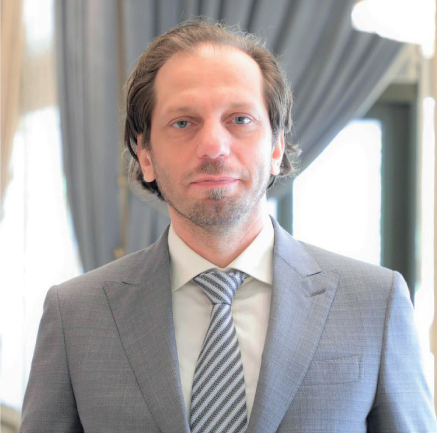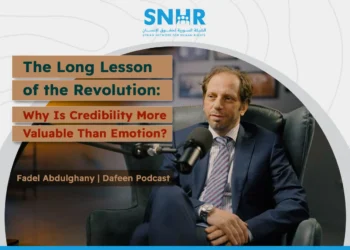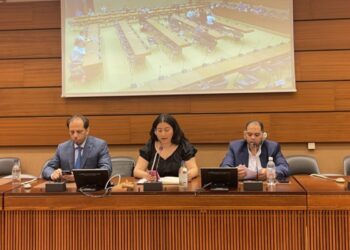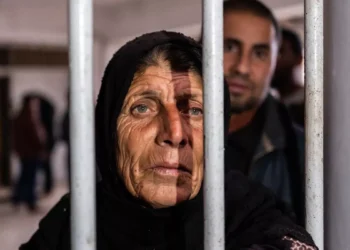Former Syrian civil engineer Fadel Abdulghany has worked for more than a decade to systematically document and inform the international community about people detained or “disappeared” by the regime of Bashar Assad – and the suffering they endured.
In the early days of the anti-regime protests that ultimately deposed Assad in late 2024, Abdulghany formed the Syrian Network for Human Rights to gather and publish information on the regime’s human rights abuses, casualty counts, and arbitrary detentions. He decided to act after noticing a gap in information collection and dissemination on the missing and witnessing the disappearance of some of his own friends.
Syria was embroiled in a brutal civil conflict from 2011 to 2024 that led to the deaths of nearly 618,000 people. Thousands were arbitrarily detained, imprisoned, and tortured for their political activism by the Assad regime, and millions more were displaced. While the conflict officially ended in December of last year, the country still faces a massive uphill battle to achieve lasting peace and security.
By empowering human rights advocates in the region like Abdulghany, the United States and the international community can encourage the formation of a democratic Syria and counter the influence of authoritarian regimes like Russia and China. Supporting aspiring democracies will make the United States both safer and more prosperous, and the Bush Institute recommends that human rights and democracy form core tenets of U.S. foreign policy.
Abdulghany believes the work he and his organization do is critical to keeping Syria on the path to democracy: It “will play a key role in accountability in revealing the truth … and also in reformation as well,” he said.
Abdulghany and SNHR have continued to advocate for the people of Syria and for transitional justice since Assad’s fall. SNHR was the first to break the news that the over 100,000 “disappeared” – people taken by the regime without notice and for whom no information was given – were all likely murdered by Assad and his government.
Collecting information like this has helped hold the perpetrators of these crimes accountable.
Multiple former Syrian regime officials have been prosecuted and convicted for human rights abuses based on the extensive documentation by SNHR and other international organizations. One example is Col. Thaer Hussein, who was arrested in July and was a senior officer at Sednaya Military Prison, aka the “Human Slaughterhouse.” These efforts to hold former officials accountable have only increased following the regime’s collapse.
Abdulghany has also sought to engage with the provisional government by sharing the data SNHR has compiled over 13 years. He has also offered recommendations to strengthen Syria’s internal accountability mechanisms. In particular, SNHR has worked with the newly formed National Commission for Missing Persons (NCMP) to address the issue of disappeared people in Syria.
The struggles and hardships the people of Syria faced during the civil war – and in this transitional period – aren’t unique. But this fight for freedom has become even more important as the rise in autocracy around the world threatens to undermine democratic ideals and universal values that contributed to the relative global peace and security of the last century.
Backing the work of Abdulghany and SNHR is a great place to start. The organization monitors and documents human rights violations and outbreaks of violence to raise awareness, promote human rights, advance transitional justice, and help achieve a peaceful and democratic Syria. Gathering and organizing this information serve to keep a constant record of the crimes the regime committed and their impact on the Syrian people, as well as hold participants accountable.
The SNHR recommends multilevel accountability, not only from former members of the regime and its military forces, but also from members of society that participated in or facilitated the crimes the regime committed against the Syrian people, such as the media and aid groups.
Holding authoritarian regimes accountable and penalizing human rights abusers are an essential part of upholding democracy around the world. One way to achieve this is through initiatives such as the Global Magnitsky Human Rights Accountability Act, which gives the president the power to target economic sanctions on foreign nationals who might have been involved in human rights abuses.
The fight for freedom and democracy is universal, and backing human rights defenders and democracy advocates advances U.S. national interests. It also is both strategically and morally the right thing to do.
The work Abdulghany and his organization have been conducting is incredibly important to Syria’s successful transition to democracy– and it’s also risky.
Insurgent groups like the Islamic State and remaining Assad supporters continue to intermittently attack government forces and civilians, ambushing government security forces and launching assaults on villages. Clashes continue between and among minority communities, such as the Druze and Bedouin communities in the province of Sweida.
The United Nations has begun sounding the alarm, stating it’s “gravely concerned” about the outbreak of violence against minorities. Thousands more Syrians have been killed in attacks like these despite the end of civil war months ago.
SNHR strives to ensure the “continuous responsibility” of the actors involved with supporting the Assad regime and holding them accountable for the “heinous crimes” they committed against the Syrian people, Abdulghany said in an interview.
“As a civil society, we can engage in our own capacity, we can reveal a fate for thousands of the enforced disappeared,” he said. “We can publish a roadmap.”






